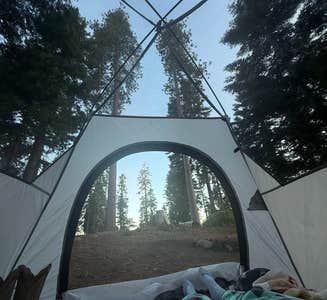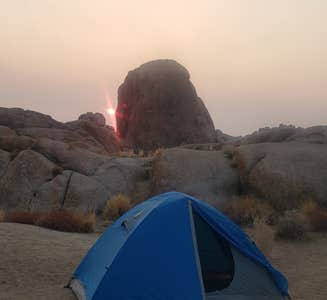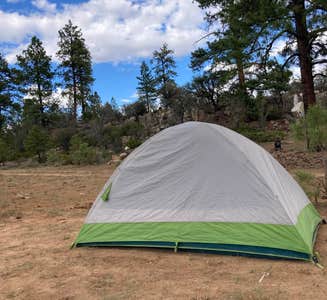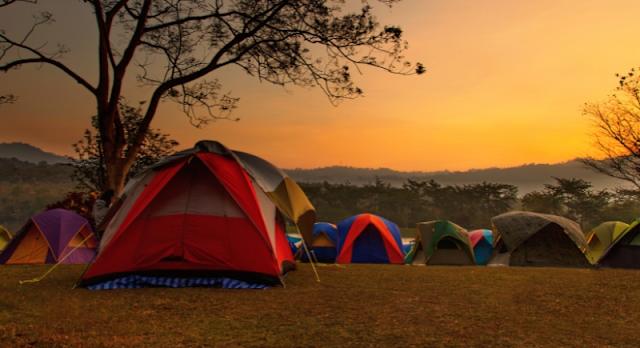Are you dreaming of a camping trip without spending a dime on a campsite? Imagine pitching your tent in beautiful, quiet spots where you can truly connect with nature—without worrying about fees.
Finding places to camp for free might seem tricky, but it’s easier than you think. You’ll discover the best locations and insider tips to help you enjoy your outdoor adventure without breaking the bank. Ready to unlock the secrets of free tent camping?
Keep reading to find out where your next adventure could begin.
Wild Camping Basics
Wild camping means camping outside of official campsites. It lets you enjoy nature in quiet places.
You can camp in forests, mountains, or near lakes, but you must follow rules and be respectful.
Legal Aspects To Consider
Different countries have different laws about wild camping. Check local rules before you camp.
Some places allow free camping only for one night. Others require permission from landowners.
- Ask landowners if camping is allowed
- Camp away from private property
- Respect protected areas and wildlife
- Follow fire safety rules
- Leave no trace behind
Essential Gear For Tent Camping
Good gear keeps you safe and comfortable while camping outdoors. Pack only what you need.
Bring a strong tent, sleeping bag, and cooking tools for a good camping experience.
- Tent with rain cover
- Warm sleeping bag
- Sleeping pad or mat
- Portable stove or camping cooker
- Water container and filter
- First aid kit
- Headlamp or flashlight
- Weather-appropriate clothes

Credit: thedyrt.com
Hidden National Forest Sites
Camping in a tent for free is possible in many hidden spots inside national forests. These places offer peace and natural beauty without the cost of a campground.
National forests have large areas where you can camp without fees. These areas are less known and provide a quiet experience in nature.
Secluded Spots In The Pacific Northwest
The Pacific Northwest has many national forests with quiet places to camp for free. These spots are far from busy campgrounds and roads.
In forests like the Gifford Pinchot and Mount Hood, you can find hidden clearings. They are great for setting up a tent and enjoying the forest sounds.
- Look for dispersed camping areas marked on forest maps
- Camp at least 200 feet from water sources
- Follow Leave No Trace rules to keep spots clean
- Check fire regulations before lighting a campfire
Quiet Areas In The Appalachian Mountains
The Appalachian Mountains have many national forests with free camping spots. These areas are often hidden along less traveled trails.
In forests like the George Washington and Jefferson National Forests, you can find peaceful spots for tents. These places offer solitude and beautiful views.
- Use forest service roads to reach remote camping areas
- Camp away from main hiking trails to avoid crowds
- Pack out all trash and food scraps
- Respect wildlife by keeping a safe distance
Remote Blm Land Campsites
Camping on Bureau of Land Management (BLM) land lets you enjoy nature for free. These lands are often remote and quiet. They offer a great way to camp without paying fees.
BLM land covers millions of acres in the United States. You can find many spots where you can set up a tent far from crowds. These places are perfect for those who like peace and adventure.
Best Locations In The Southwest
The Southwest has some of the best BLM lands for free camping. These areas have beautiful desert views and wide-open spaces. You can find quiet campsites with amazing sunsets.
Popular spots include deserts, canyons, and mountain areas. These places offer a true backcountry experience. You can explore nature and enjoy starry nights.
- Arizona: Around Lake Mead and near the Vermilion Cliffs
- Utah: Near Moab and in the San Rafael Swell
- New Mexico: Near the Gila National Forest and Chihuahuan Desert
- Nevada: Areas around Red Rock Canyon and Black Rock Desert
Tips For Camping On Blm Land
Camping on BLM land requires some planning. You must follow rules to protect the environment and keep the area clean. Always check for any local restrictions before camping.
Be prepared for no facilities. Bring water, food, and all camping gear. Pack out all trash and leave no trace. Respect wildlife and keep noise low.
- Camp at least 200 feet away from water sources
- Use existing fire rings if fires are allowed
- Check for fire bans before starting a campfire
- Use a portable toilet or bury waste properly
- Leave plants and rocks undisturbed
- Inform someone about your camping location and plans
Coastal And Beach Tent Camping
Camping by the coast is a great way to enjoy nature and the ocean. Many beaches allow tent camping for free.
You can sleep near the waves and wake up to fresh sea air. It is important to know where to camp and follow rules.
Undiscovered Beaches For Free Camping
Some beaches are less known and allow free camping. These spots give you privacy and a quiet place to stay.
Look for state parks, national forests, or public lands with coastal access. These places often have free tent camping.
- Hidden coves along the Pacific Coast
- Remote beaches in the Gulf Coast region
- Secluded shores near the Atlantic coast
- Public lands with beach access in Alaska
Beach Camping Rules To Follow
Every beach has rules to protect nature and campers. Follow these rules to keep the area clean and safe.
Rules also help avoid fines or being asked to leave. Respect wildlife and other visitors while camping.
- Camp only in designated areas if required
- Do not disturb plants, animals, or dunes
- Pack out all trash and leave no trace
- Keep fires small and use fire rings if allowed
- Respect quiet hours and other campers
- Check local regulations before camping
Mountain And Backcountry Sites
Camping in the mountains and backcountry offers a quiet escape from busy life. You can find many places where tent camping is free and peaceful.
These sites let you enjoy nature fully. You will see beautiful views and hear only nature sounds.
Tenting In Lesser-known Mountain Ranges
Many smaller mountain ranges have free camping spots. These places are less crowded and give more privacy.
Look for national forests and public lands. They often allow free tent camping away from main trails.
- Check local forest service websites for rules
- Camp at least 200 feet from water sources
- Use existing campsites to reduce impact
- Pack out all trash and waste
Safety Tips For Backcountry Camping
Backcountry camping needs careful planning. You should prepare for weather and wildlife risks.
Tell someone your plans before you leave. Always carry a map, compass, and first aid kit.
- Check weather forecasts before camping
- Bring enough food and water
- Store food away from animals in bear-proof containers
- Wear proper clothing and sturdy boots
- Know basic first aid and emergency signals

Credit: thedyrt.com
Urban And Suburban Free Camps
Camping in a tent does not always mean traveling far. You can find places to camp for free near cities and towns. Urban and suburban areas offer spots to pitch your tent without paying.
These free camps let you enjoy nature while staying close to city life. It is important to know where to look and how to respect these areas.
Camping Near City Limits
City limits often have parks or open lands where camping is allowed for free. These areas are easy to reach by car or public transport. They give quick access to city services if needed.
Look for public lands, green belts, or unused lots near the edge of cities. Some cities have designated camping zones you can use without a fee. Always check local rules before setting up your tent.
- Check city parks with camping policies
- Use public lands on city outskirts
- Ask local offices about free camping spots
- Follow all rules and clean up after camping
Finding Quiet Spots In Suburbs
Suburbs can hide peaceful camping spots in small parks or near nature reserves. These places are less busy than city centers but still near homes and shops. This makes camping easier and safer.
Explore suburban green areas or unused land patches. Some neighborhoods allow camping on community land with permission. Being quiet and respectful helps keep these spots open for campers.
- Look for suburban parks with open space
- Ask neighbors or local councils for permission
- Choose spots away from busy roads
- Keep noise low and pack out all trash
Environmental Ethics For Free Camping
Camping in a tent for free is a great way to enjoy nature. It is important to protect the environment while camping.
Following good environmental ethics helps keep nature clean and safe for everyone. It also protects plants and animals.
Leave No Trace Principles
Leave No Trace means camping without harming the environment. Campers should leave the place as they found it.
These principles help reduce damage to land, water, and wildlife. They also keep camping areas beautiful for others.
- Pack out all trash and litter
- Camp at least 200 feet from lakes and trails
- Use a camp stove instead of making fires
- Dispose of waste properly, including human waste
- Do not pick plants or disturb natural features
Respecting Wildlife And Nature
Respecting wildlife means watching animals from a distance. Do not feed or touch wild animals.
Keep noise low and avoid sudden movements. This helps animals feel safe and reduces stress.
- Store food securely to avoid attracting animals
- Do not chase or try to catch wildlife
- Observe plants without damaging them
- Stay on marked trails to protect habitats
Planning Your Free Camping Trip
Camping for free is a great way to enjoy nature without spending much money. With some planning, you can find safe and beautiful places to set up your tent.
Good preparation helps you avoid problems and makes your trip fun. Focus on finding the right spot and getting ready for emergencies.
Researching Locations
Look for public lands where camping is allowed without a fee. National forests and Bureau of Land Management areas often allow free camping.
Check local rules and maps online to find spots that fit your needs. Some places have limits on how long you can stay.
- Use official websites for updated camping information
- Read reviews from other campers
- Find spots near water and trails
- Note any fire restrictions or seasonal rules
Preparing For Emergencies
Be ready for unexpected situations like bad weather or injuries. Always tell someone your camping location and plans.
Carry a first aid kit, extra food, and water. Know how to use your gear and where to get help if needed.
- Pack a first aid kit with bandages and medicines
- Bring a flashlight and extra batteries
- Have a map and compass or GPS device
- Know the nearest emergency contact numbers

Credit: thedyrt.com
Frequently Asked Questions
Where Can I Find Free Tent Camping Spots?
You can find free tent camping spots on public lands like national forests and Bureau of Land Management areas. Websites like FreeCampsites. net and apps like Campendium are useful for locating these areas. Remember to follow Leave No Trace principles to preserve the environment for future campers.
Is It Legal To Camp For Free Anywhere?
Camping for free is legal on public lands, but restrictions vary by location. Check local regulations and guidelines before setting up camp. Some areas may require permits or have time limits. Always respect posted signs and avoid camping on private property without permission.
What Essentials Should I Pack For Free Camping?
Pack essentials like a sturdy tent, sleeping bag, portable stove, and first-aid kit. Bring enough food and water, and consider a map or GPS device. Don’t forget items like a flashlight, insect repellent, and extra clothing. Ensure you have everything needed for a safe and comfortable experience.
How Can I Find Free Camping Near Me?
Use websites and apps like FreeRoam or AllStays to locate free camping near you. Social media groups and forums can also provide local insights. Check with nearby ranger stations or visitor centers for recommendations and up-to-date information on camping regulations in your area.
Conclusion
Camping in a tent for free is easier than many think. Public lands, national forests, and some parks offer great spots. Always check local rules before setting up your tent. Respect nature and leave no trace behind. Enjoy the peace and beauty of the outdoors.
With a little planning, free camping can be a fun adventure. Start exploring these places and experience nature on a budget. Camping free means more time outdoors and less cost. Give it a try and see where the road leads.

